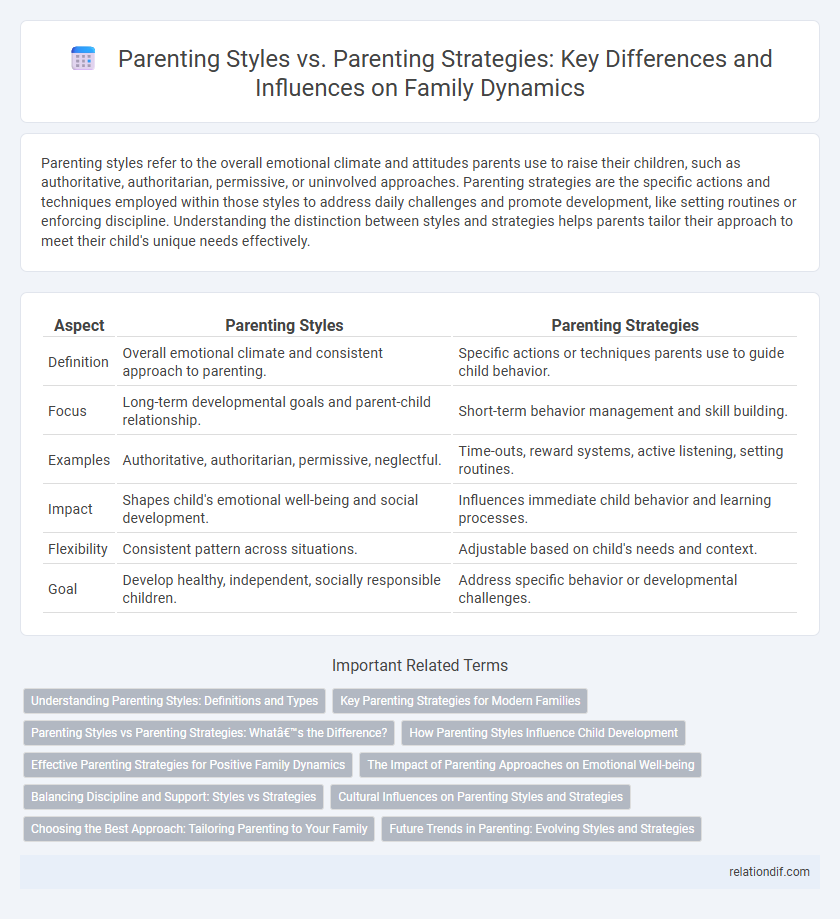Parenting styles refer to the overall emotional climate and attitudes parents use to raise their children, such as authoritative, authoritarian, permissive, or uninvolved approaches. Parenting strategies are the specific actions and techniques employed within those styles to address daily challenges and promote development, like setting routines or enforcing discipline. Understanding the distinction between styles and strategies helps parents tailor their approach to meet their child's unique needs effectively.
Table of Comparison
| Aspect | Parenting Styles | Parenting Strategies |
|---|---|---|
| Definition | Overall emotional climate and consistent approach to parenting. | Specific actions or techniques parents use to guide child behavior. |
| Focus | Long-term developmental goals and parent-child relationship. | Short-term behavior management and skill building. |
| Examples | Authoritative, authoritarian, permissive, neglectful. | Time-outs, reward systems, active listening, setting routines. |
| Impact | Shapes child's emotional well-being and social development. | Influences immediate child behavior and learning processes. |
| Flexibility | Consistent pattern across situations. | Adjustable based on child's needs and context. |
| Goal | Develop healthy, independent, socially responsible children. | Address specific behavior or developmental challenges. |
Understanding Parenting Styles: Definitions and Types
Parenting styles refer to the psychological constructs representing standard strategies parents use in raising their children, primarily categorized into authoritative, authoritarian, permissive, and uninvolved. Each style varies in responsiveness and demandingness, impacting child development outcomes such as social skills, academic performance, and emotional health. Understanding these styles helps in recognizing the underlying motivations behind parental behaviors and their long-term effects on family dynamics.
Key Parenting Strategies for Modern Families
Key parenting strategies for modern families emphasize consistent communication, emotional support, and setting clear boundaries to foster healthy child development. Employing authoritative parenting, which balances warmth and discipline, proves effective in building resilience and social competence in children. Integrating adaptive techniques such as positive reinforcement and active listening helps parents address diverse challenges and promote long-term well-being.
Parenting Styles vs Parenting Strategies: What’s the Difference?
Parenting styles refer to the emotional climate and overall approach parents use to raise their children, encompassing dimensions like warmth, discipline, and communication patterns. Parenting strategies are specific techniques or actions parents implement within those styles to address particular behavioral or developmental challenges. Understanding the difference helps caregivers tailor their overall approach while applying effective, intentional methods to promote healthy child development.
How Parenting Styles Influence Child Development
Parenting styles, such as authoritative, authoritarian, permissive, and uninvolved, significantly shape a child's emotional, social, and cognitive development by influencing their self-esteem, behavior, and academic success. Authoritative parenting, characterized by warmth and structure, fosters resilience and social competence, while authoritarian styles may lead to obedience but increase risks of anxiety and low self-worth. Understanding these styles helps caregivers apply effective parenting strategies tailored to nurture healthy development in children.
Effective Parenting Strategies for Positive Family Dynamics
Effective parenting strategies prioritize consistent communication, setting clear boundaries, and fostering emotional support to promote positive family dynamics. Authoritative parenting, characterized by warmth and structure, often leads to better child behavior and emotional well-being compared to authoritarian or permissive styles. Incorporating strategies such as active listening and positive reinforcement enhances family cohesion and resilience.
The Impact of Parenting Approaches on Emotional Well-being
Parenting styles, such as authoritative, authoritarian, permissive, and uninvolved, fundamentally shape a child's emotional well-being by influencing their self-esteem and coping mechanisms. Effective parenting strategies, including consistent communication, positive reinforcement, and emotional support, directly enhance resilience and emotional intelligence in children. Research shows that balanced approaches combining warmth and structure yield the most favorable outcomes for healthy emotional development.
Balancing Discipline and Support: Styles vs Strategies
Balancing discipline and support in parenting requires understanding the difference between parenting styles and strategies; styles represent consistent patterns of behavior such as authoritative or permissive, while strategies are specific actions parents use to guide behavior effectively. Authoritative parenting, characterized by high responsiveness and demandingness, balances firm discipline with emotional support, promoting children's social and emotional development. Employing tailored strategies like setting clear expectations and positive reinforcement within the authoritative style enhances child outcomes by fostering motivation and self-regulation.
Cultural Influences on Parenting Styles and Strategies
Parenting styles and strategies are deeply shaped by cultural values, norms, and traditions, influencing how caregivers nurture and discipline children across different societies. For instance, collectivist cultures often emphasize authoritative or authoritarian styles, prioritizing respect and obedience, while individualistic cultures tend to support permissive or authoritative strategies that foster independence and self-expression. Understanding these cultural influences helps tailor effective parenting approaches that align with family values and promote children's emotional and social development globally.
Choosing the Best Approach: Tailoring Parenting to Your Family
Parenting styles, such as authoritative, authoritarian, permissive, and uninvolved, shape the overall emotional climate and expectations within a family, while parenting strategies are specific techniques customized to meet a child's unique needs and developmental stage. Tailoring parenting approaches requires assessing children's temperament, family values, and situational demands to foster resilience, communication, and emotional intelligence effectively. Selecting the best approach enhances child development outcomes by aligning consistent guidance with responsive, adaptive methods that respect individual differences.
Future Trends in Parenting: Evolving Styles and Strategies
Future trends in parenting reflect a shift towards more adaptive and individualized approaches, blending authoritative and permissive styles with evidence-based strategies that prioritize emotional intelligence and resilience. Technological advancements and increased access to psychological research influence parents to adopt proactive communication and digital literacy techniques to support child development. Emphasis on cultural sensitivity and inclusivity is growing, shaping parenting strategies that prepare children for a diverse and rapidly changing world.
parenting styles vs parenting strategies Infographic

 relationdif.com
relationdif.com